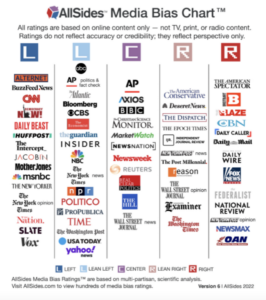Information Literacy
Protect yourself from misinformation
As publication and sharing tools become more ubiquitous in our daily lives, it has become easier than ever to fall prey to misinformation online. Being information literate includes the ability to distinguish fact from fiction online, a critical skill in stopping the proliferation of mis- and dis- information.
Consider some of the resources below to determine if, or how much, something should be trusted.
Check for Bias
Bias is the strong inclination or preconceived opinion about something or someone, and can both be in favor of an idea or slanted against it.
We all have certain levels of bias, and so do news sources. Use the links to the right to see what bias(es) your go-to news sources have.

Everyone is biased — and that’s okay. There’s no such thing as unbiased news. But hidden media bias misleads, manipulates and divides us.
AllSides helps make news bias transparent, allowing you to identify different perspectives and political leanings so you can get the full picture and think for yourself.
Ad Fontes helps consumers navigate the current complex media landscape and make healthy news choices.
Ad Fontes uses a rigorous, non-partisan methodology to analyze and rate news for overall reliability and bias.
Check the Facts
Beyond bias, sometimes online information is just plain wrong.
If something elicits a strong emotional response when you read it or seems sensationalized or outlandish, check the sources on the right to see if it’s true.